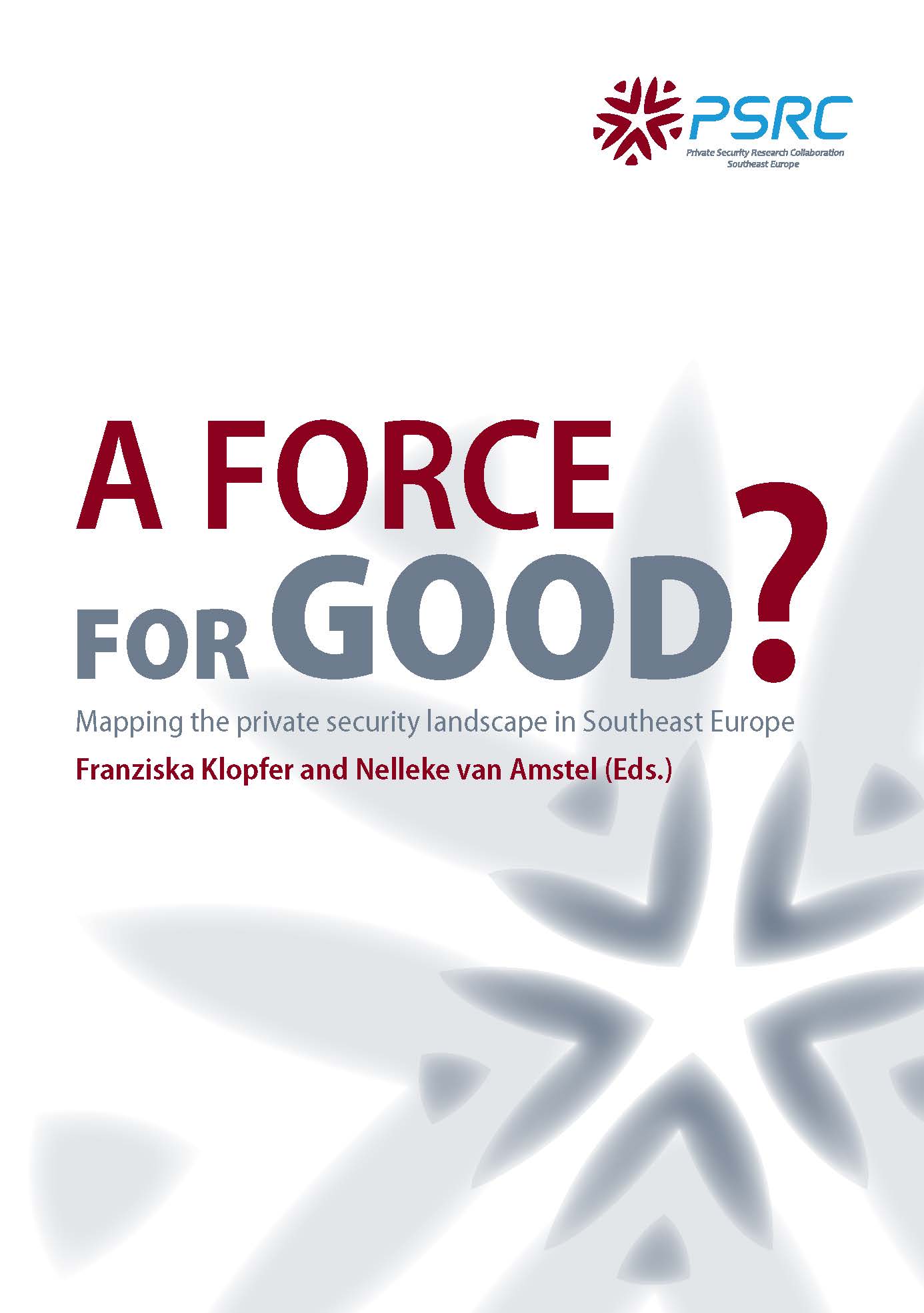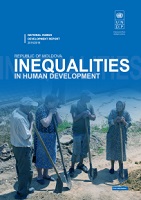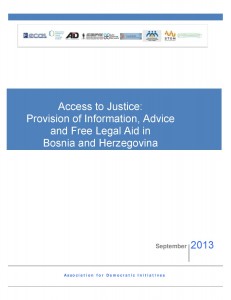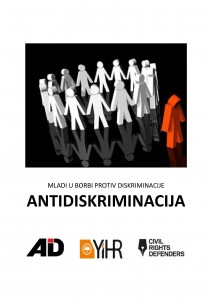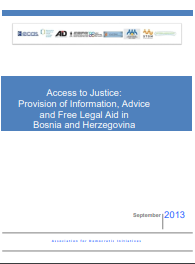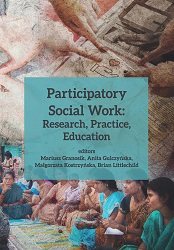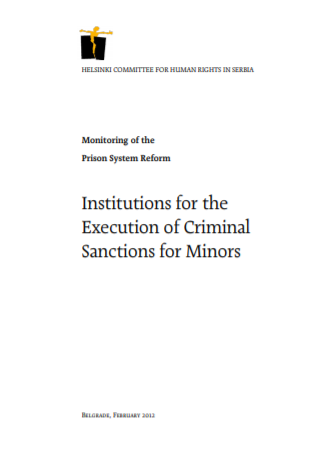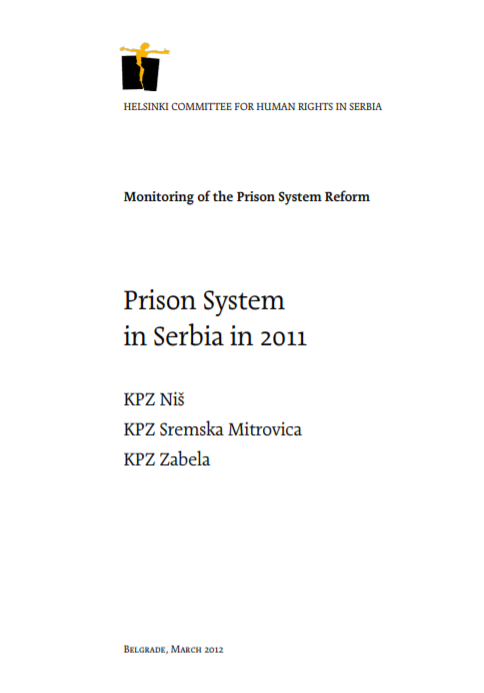Author(s): Elma Demir / Language(s): Bosnian
(B/H/S edition)
Iako je, od konflikta sredinom 90-ih godina prošlog vijeka, Bosna i Hercegovina (BiH) ostvarila popriličan napredak, još uvijek je suočena sa značajnim preprekama u pogledu razvoja, kao što su visoka stopa nezaposlenosti, nedovoljno razvijena ruralna područja, te neefikasan sistem socijalne pomoći koji ne dobiva dovoljno sredstava. Ekonomija se nalazi na 70% svog predratnog nivoa razvoja, a 20% stanovništva živi ispod granice siromaštva, što je jako visok procenat, imajući u vidu da još 30% stanovništva živi neznatno iznad granice siromaštva. Ako uzmemo u obzir ove činjenice, uspostavljanje efikasnog sistema besplatne pravne pomoći još više dobiva na značaju, imajući u vidu socijalni status građana BiH i stope siromaštva u zemlji. Uz to, mnogi građani i dalje nisu informirani o svojim pravima i veliki broj neriješenih slučajeva koje su pokrenuli građani ometa efikasno funkcioniranje sudova u BiH. 1 Na koncu, veliki broj građana širom BiH uviđa da bi u zemlji trebalo postojati jednako zagarantirano pravo na minimum besplatne pravne pomoći (90%).2 I pored ovakvog stanja, postojeći sistem besplatne pravne pomoći u BiH ne može, na jednakoj osnovi, obezbijediti minimum usluga pravne pomoći svim građanima u BiH. Kao takav, sistem ne zadovoljava međunarodne i evropske standarde u ovom pogledu. NVO Vaša prava, najveći pružatelj besplatne pravne pomoći u zemlji, navodi da postojeći okvir za besplatnu pravnu pomoć “karakterizira odsustvo planske politike u sistemu besplatne pravne pomoći, odstupanja od Strategije reforme sektora pravosuđa u BiH, te fragmentiranost i različit pristup u rješavanju pitanja besplatne pravne pomoći. Također, uloga nevladinih organizacija u sistemu besplatne pravne pomoći je kontinuirano minimizirana, što je vodilo apsolutnom isključenju NVO iz procesa javnih konsultacija.”3 Javne institucije nisu proaktivne u organiziranju pružanja besplatne pravne pomoći na sistematski način. U Republici Srpskoj, Brčko Distriktu i nekoliko kantona nedavno je osnovano nekoliko službi za pravnu pomoć, ali one i dalje nisu dostupne u mnogim drugim kantonima i u većini ruralnih područja. Ova i druga slična pitanja prepoznata su kao razlozi za usvajanje zakonskog okvira na nivou države koji bi obezbijedio osnovnu besplatnu pravnu pomoć i zakonske mehanizme za reformu postojećih zakona koji mogu biti izvor diskriminacije protiv građana na osnovu mjesta gdje žive. Cilj ovog izvještaja je da doprinese postojećoj debati o politikama time što će se u izvještaju analizirati zakonski okvir i postojeće prakse koje se odnose na usluge pružanja informacija i pomoći građanima te da se u istom identifikuje nekoliko ostvarivih preporuka u vezi sa politikama. Kako bi se započela rješavati ova pitanja i opcije u vezi sa politikama, u periodu od marta do maja 2013. godine, provedena je anketa o uslugama pružanja informacija, savjeta i pravne pomoći u Bosni i Hercegovini. Cilj ankete bio je da se mapiraju postojeće usluge pružanja informacija i pomoći za građane, da se identifikuju nedostaci u kontekstu usluga te da se izrade preporuke u vezi sa politikama. Anketom je obuhvaćen veliki broj javnih institucija – uključujući općine i pružatelje besplatne pravne pomoći, a kontaktirane su i nevladine organizacije i sindikati. U anketi je učestvovalo ukupno 65 organizacija, od kojih su 24 bile javne institucije (institucije za besplatnu pravnu pomoć i općine) i 41 nevladina organizacija.
More...
